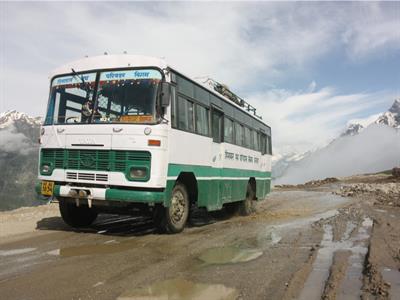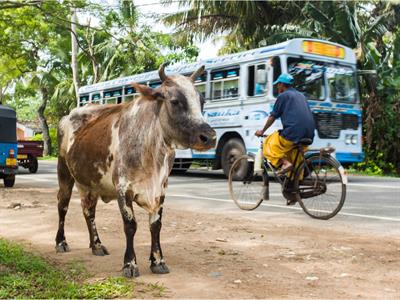
PUMPA - SMART LEARNING
எங்கள் ஆசிரியர்களுடன் 1-ஆன்-1 ஆலோசனை நேரத்தைப் பெறுங்கள். டாப்பர் ஆவதற்கு நாங்கள் பயிற்சி அளிப்போம்
Book Free DemoThe lesson 'Madame Rides a Bus' by Vallikanan is originally written in Tamil as 'Oorvalam Pona Periya Manushi'. The story is about an eight-year-old young girl named Valliammai. She was called Valli in short. Young girls, especially those who grow up in small towns, are generally curious about a lot of things. The story is set in earlier times when technology had not taken over and the world was not very modern in its approach.
Similarly, Valli is also curious about everything. She was curious about everything that moved around her and life itself. She loved to stand outside her house and observe what is happening in the streets. It is always a different experience to observe busy streets as one may find people from different walks of life heading towards different directions. You might find a vendor trying to sell his fruits, little children trying to play hide and seek, or horse carts moving. These images give an insight into a lot of perspectives. Poor Valli did not have any friends of her age, which made her more lonely, giving her more need to observe the outer world. But Valli was not upset that she did not have friends as watching the street gave her a lot of unusual experiences. It was even better than playing games with other children.

Bus*
We all have dreams and goals in life. It keeps changing in different stages of life based on our maturity levels. When we were young, we had the simplest of dreams, like eating chocolates, going to the theme park etc. Similarly, Valli's deepest wish was to travel in a bus as she was mesmerised by how it moved swiftly from one place to the other. The bus transported people from her nearest village to the next town. People from the village generally go to the town to buy things, as a village only has some facilities. The bus passed by Valli's village every one hour, and it returned with people from the town to the village. Valli was filled with unending joy to see the passengers being shifted from the village to the town.
It is very easy to manifest what we see regularly. A lot of scholars ask people to write their goal and stick it in places they are more prone to seeing. Similarly, Valli, who enjoyed watching the bus daily, slowly started wishing to travel in it. It was an overwhelming feeling for her to imagine herself being seated on the bus that she had just been standing by and watching. She also observed the people who boarded the bus, as it was their faces that made her long for the ride. It kindled in her longings, hopes and dreams of exploring new places and going on an adventure.

Passengers on a bus
If we do not get a thing that we desire, we would not like other people flaunting it, as it might make us jealous. So we tend to make statements that the person is being too arrogant or proud. Similarly, Valli does not like it when her friends travel on the bus and flaunt it. She uses the word proud repetitively, although she does not understand the meaning of the word as it is in English. In the earlier days, English was not very common among the village folk. She and her friends used the word as slang for disapproval.
Once Valli set up her dream, she needed the plan to execute it. But it was very difficult for an eight-year-old to realise her dream of travelling on a bus. If she informed her parents, it would be brushed off, saying that it was unimportant. So she decided to take things into her hands. She listened to people talking about the bus keenly. She initially listened to people who had hands-on experience on the bus, the passengers. Valli did not make it obvious that she was listening as it would instil doubts. So she casually listened to people talk about the timings and route of the bus.
Valli picked up small details, like her village was six miles away from the town. She also heard a well-dressed man say that the ticket fare was thirty paisa one way. But to Valli, who was from a simple background, it was a huge amount. It was a fortune since she only sees that much amount after a whole month has passed. She also learnt that it would take forty-five minutes to reach the town. This meant that she could sneak in and take the one-o'clock bus and reach the town in forty-five minutes. If she does not get down from the bus, then she can return back in the same bus and reach the village back by two forty-five. Thus Valli made all plans with respect to the fare, duration and other things. She planned and re-planned several times to make sure that nothing goes wrong.
Valli plans to execute her goal on a Spring afternoon finally. It is really exciting when we get to realise our dreams after a long planning and thinking. When Valli was about to board, the bus had already started moving. Since it was a small village, people would run behind and call the conductor if they were late. Likewise, the bus, which had by then picked up speed, slows down after hearing someone calling out that there is one more person yet to board. The conductor is irritated as he wonders why people are always late, making the bus slow down as soon as it was started off. He sees Valli run behind and imagines that she is voicing out for some adult who cannot run. He could have also thought that Valli was accompanied by an adult. He, therefore, asks her to make the person who wants to board the bus to come fast. But he is shocked to find that it was Valli who wanted to board the bus alone.

Valli runs to catch the bus
He tells her that it is surprising, but Valli does not back off as she proudly shows the money that she has got. She knows her rights and therefore stands firm. The conductor is still sceptical, but since he had to set off on the journey, he says that she cannot stand outside the bus and keep talking. He stretches his hand out to her to help her climb in. But Valli does not take it and proudly climbs in, partly because she is excited to set foot into her long-term dream and partly because she wants to show that she is confident.
The conductor is a jovial person, and when he sees the eight-year-old throwing air, he takes it in a fun spirit and addresses her as Madam, and says that she should take up the front seat, and everyone should make way for her as she is acting important. It was midday, and usually, people only travel a little at that slack time. Hence there were only five or six passengers in total. They all laughed at Valli since it was new and cute to see a child behaving like an adult. Valli was shy and, therefore, did not look into their eyes. She knew that people were noticing her, and she walked slowly into the bus and sat on an empty seat.
Since everyone had settled down in the bus, and Valli had made such a fuss about getting into the bus, the conductor still maintained his sarcasm. He acts as if he is an attendee of a queen and seeks permission to start the bus. He blows the whistle to signal that the driver can start with the journey and the bus roars off into the town. The author gives a fine description of the Pallavan bus that used to go the rounds in Tamil Nadu during the earlier days. It is white in colour with green stripes along the sides. It was a new bus and therefore had nice cushion seats. There was a clock on top above the windshield for the driver to start the bus on time.
The overhead bars in the bus, which are used by standing passengers to maintain balance, were shiny like silver. Valli was quite excited to see all these new kinds of stuff around her. She wanted to look outside just like all the passengers she had seen, thereby enjoying the scenery on the way. But the canvas bind that was used to block sunlight or raindrops from entering the bus blocked her view as it covered the lower part of the window. She was a little girl, and therefore she could not take a peek from the top view as she was short. But Valli was not someone to budge. She stood up on the seat so that she could get a proper view of everything.

Valli was excited to see everything
There is a difference between one standing in one spot and enjoying green fields, sunset and rivers and watching it in a movement. The air brushes off one's face and gives a pleasant feeling. Valli had her first experience of such a moment when she stood up on the seat. Outside, the bus was passing a canal. A canal always has water and is already in movement, which is all the more beautiful when one sees it from a bus. On top of that, the road was very narrow. This makes it more interesting since it makes it appear as though everything is very near.
She saw palm trees and green lands as villages are mostly covered with them. Although it was afternoon, the weather had been good, and therefore she could see the clear blue skies as the vehicle kept moving. On one side, she had the canal, and on the other side, there was a deep ditch which meant the surface was low, and she could see the far away green spaces filled with trees. It was green as far as she could see. In today's world, one does not enjoy a bus ride because there is smoke from pollution and buildings that cover up everything. But Valli really enjoyed the scenic beauty.
Valli being a young girl, is only bothered about having fun and does not know the risks of standing on a bus. She could fall down and hurt herself. Generally, it is difficult to stand on a bus without holding on to the bar above. Any vehicle, when it picks up speed, has a different momentum that might put the people who are standing off balance. Even adults are susceptible to this danger. Seeing this, an elderly gentleman cites this as a reason and asks Valli to sit down. He addresses her as a child when he asks her to sit for her own safety. Valli does not like being called a child as she gets into the bus to enjoy the ride like the other passengers. She did not want to be treated separately. In order to make her seem equal, she says she has also taken a ticket just like the others. This was her only way to make herself seem mature.

Indian coins
The conductor, who was listening to the conversation, chimes in with his usual sarcasm. He tells the older man that Valli is right and that she is not just an ordinary person. He says that she is a big madam and that she is indeed grown up. He also uses her statement, saying she's grown up because she has money to get the ticket. But Valli does not understand that he is making fun of her and emphasises the fact that she is not a child and is there to enjoy and travel with other people. She is also wise enough to know that she needs a ticket to travel and reminds the conductor that he still needs to give her the ticket. He replies that he will not forget, as he likes to have more fun with her. He mimics her tone, which is funny and makes other people laugh. Valli loosens up and understands that he does not mean any offence. Hence she joins the laughter and cools down.
Although he has fun, the conductor is nice and is worried about Valli's safety. He asks her to sit in her seat, citing that she has paid for a seat and that it would be a waste of money if she does not use it. Valli does not sit down as she wants to see the scenes around. But she does not tell the conductor as she does not want everyone to know. But the conductor explains that she might fall down and hurt herself when the bus is taking a turn and goes on a bump. When he is gentle, he addresses her again as a child, which forces her to emphasise again that she is no child.
The conductor does not take it as offensive and goes with the flow and apologises, saying that he almost forgot that she is eight years old, posing as if it is too old. As the bus makes more stops, the conductor becomes busy with the other passengers. Valli sees more passengers and sits down as she does not want to lose her seat. An older woman enters the bus and sits next to Valli. She engages in a conversation and asks her from where she is. Valli found her irritating and did not like her from the first moment.
She looked like the typical older woman from the villages, as she had big earrings in her two big ear lobes. All older women used to wear it to express their wealth statement and cover their longer ear lobes. She also chewed betel leaves, which were sprinkled out when she opened her mouth to talk. Valli thought that no human being would be sociable with such a person. She did not want to converse with her and curtly replied that she was all alone. The conductor, who had by now settled, chimed in that she was going to the town with her thirty paisa ticket. He says this because he anticipates Valli to say it as she had to all other people. But the older woman was more curious about the safety of Valli as she said that it was dangerous for her to travel alone. She is also worried that Valli will be lost and asks her where exactly she is heading, the door number etc. But Valli is irritated by the constant questions and curtly replies that she can take care of herself and that the woman need not bother about her.
It was not easy for Valli to go on this trip as she had to make elaborate plans to sneak out of her house. Once it is achieved, she feels a sense of thrill and excitement. She had saved all the small amount she could collect for the bus fare. She repeatedly keeps telling everyone that she has a ticket as a means to confirm it. As a child, it was really difficult for her to resist the temptation to buy peppermints, candies, balloons etc., which every little child craves for. She collected sixty paise by saving from these things. This shows her determination to travel on the bus and that she was ready to forego all her favourite things. It was intense to the extent that she desperately wanted to go on a merry-go-round at the village fair and had to limit her desire to do so, even though she had the money. A village fair is a rare occasion, and people indulge in themselves as it is like a festival. But Valli resisted the urge as the bus ride had more prominence to her.
The next problem was a huge one, as it did not involve her own determination or sacrifice. This was a problem that all kids of her age faced. Parental surveillance would be an issue if she were to sneak out uninformed. She did not think that her mother would understand why it was important for her to travel on the bus. But she found a way to get out of the situation too. Her mother usually takes a nap from one to four after her lunch. And this had always been Valli's time to explore and get into her own unique world. This was the time she stood at the entrance of her home and wondered at the fast-moving world around her. She also took her little excursions around the village as she wandered around curiously, looking at everything around her. She had only gone on these excursions within the village limits, and now she was ready to get outside the village.

Village Fair**
Valli recalls the struggles and journey of finally taking the bus ride outside the village. She cherishes every moment of the ride as she curiously looks at the scenic beauty outside. As the bus had to move out of the village, there were very few buildings and shops. It was mostly bare land that the bus rolled on. It was initially slow, but as it slowly got off the boundaries, it slowly picked up speed. It slowly entered a smaller village, a hamlet. She also sees some old wayside shops. In the villages, there are very few shops, mostly located on the sides of the road for easy accessibility.
Valli, having never experienced the bus ride, finds everything new. As it is, she finds it unique that she is able to move from one place to another. There were other vehicles on the road, and the bus was speeding up in such a way that it felt as if it was going to gobble the other vehicles that were racing towards it. It even felt like it would gobble up the simple pedestrians walking or crossing the road. But to her surprise, the bus just casually crossed all the vehicles and people. It passed smoothly and left all the things behind. As children, most of us think that the things on the road, especially the trees, are rushing towards the bus as it keeps moving forward. As one moves forward, it also feels like the trees are thrown behind. It looked as though they were rushing towards her, and as soon as the bus reached them, they stood there like a helpless person and, in a minute, rushed away in the other direction.
Valli sees not only the trees and people but also a cow that is trying to cross the road. She clapped her hands in glee. This is not because she has never seen a cow but because she found it exciting to see it in front of the bus. It had its tail right up in the air as it was running fast to the middle of the road. The driver who had picked up speed had to stop as he did not want to hurt it. The bus slowed down to a crawl, and the driver honked at the cow as he was irritated by the sudden interruption. But animals do not like to be overwhelmed, so the more he honked, the more frightened the cow was. It galloped more right in front of the bus. Valli was amused by this, as it was a new experience for her. She clapped her hands like any other child expressing happiness. The conductor teased her about saving some laughter for the next day as she was rolling with laughter.

Cow in front of a bus
Valli is extremely happy about getting new sights to watch as this is her first time exploring the brave new world. She is taken aback by a cow which is scared of the bus and refuses to move. After the adventure, the cow moved off the road, and Valli was cheerful. The bus next goes to a railroad crossing. Normally the train tracks run through the middle of the road, and vehicles on either side are made to wait by a check post for the trains to cross. Trains move fast; therefore, Valli sees it from a distance as a small speck, but it soon looms bigger as it draws near. This does not mean the train transformed its size, but the distance made it appear small. Not only the size but the intensity also increases as it crosses the bus. There was a tremendous roar and rattle as it sped across the bus, nearly shaking it. There are express trains that could pass in a jiffy and cause quite an uproar. The bus slowly passed the train station.

People waiting at Railway crossing***
Valli has never been out of her small village, which only had shops for immediate requirements. But outside the city, there were fairs and colourful shops. A fair is usually organised for people from all kinds of small villages to enjoy and buy new things. Valli sees new shops with dresses, bangles and other glistening merchandise. It was a busy street, and people were shopping in bright-coloured shops. Valli was amazed and struck with wonder at all the new sights that she had witnessed. The bus finally reaches the stop, and all the passengers get down. Valli, whose sole motive was to travel in the bus, did not see the point of getting out.
She also had to go back to her village on the same bus before her mother could wake up. The conductor, who realised that Valli had not got down, enquired if she had no plans to explore the city and that her thirty paise could only take her so far. Valli immediately takes up another thirty paise and asks for another ticket home. The conductor, having never seen anyone act like this, asks if there is anything wrong and why she does not want to explore the city. She replies that she would be afraid to do that on her own. Valli knew that she could get into trouble if she did not prioritise her safety and therefore remained cautious. The conductor is surprised that she is not afraid of taking the bus, to which she bravely replies that there is nothing to be scared of the bus, showing that she has visualised it as a safe space. When the conductor offers to pay for a drink, she firmly rejects it as she keeps up her self-respect.
Valli was soo keen to explore that she hid her desire from her mother. She is aware that if she is caught, she will be in trouble. But certain things take a bit of courage, and she took a chance. But the conductor was worried about the eight-year-old girl travelling alone from the village to the city. As a conductor, he has to give her the ticket, and he does so with a curious mind. He has never seen a kid of her age travel alone in the bus with so much confidence and no purpose of roaming the city. He asks her if her mother would be searching for her because what kind of mother sends her child alone on the bus. But Valli does not give up her secret plan and curtly responds that she has no one searching for her. She was careful enough not to reveal all details to a stranger.
Valli was prepared to enjoy the return journey as much as possible. She was not bored of seeing the same sights again. She was looking forward to enjoying the ride back home. She greeted everything with the same excitement that she felt the first time. But her happiness does not last long. The cow she had witnessed on her journey to the city was there again. But this time, it was in a different scenario. The cow was lying dead on the roadside. It had escaped Valli's bus but unfortunately got hit by another bus and lost its life. Some fast-moving vehicle had taken its life away. Valli could not believe her eyes and confirmed with the conductor that it was the same cow running in front of them.

The cow's death made Valli sad
When Valli found that it was the same cow that had made her laugh once was dead now, she was overcome with sadness. Life is so fleeting and fragile that what we enjoy in one moment can come to an end. The cow was so enthusiastic and happily running around with so much life in it. And all of a sudden, its charm had been lost since it had no life in it. The carcass looked horrible and hard to describe as it lay there lifeless with its legs spread. Its eyes had a stare when life had drained out of its body. There was blood everywhere. The bus moved on, but Valli lost all her enthusiasm as the sight of the dead filled her with sorrow. She no longer wanted to look out of the window. She sat in her seat and did not move at all. But she reached her village by three forty as she had planned. She bid farewell to the conductor, who teased her, saying that madam could come in his bus whenever she felt like it if she brought her fare.
Valli had the experience of her life when she finally dared to get out of the house and explore the joy that lay on the bus ride. She had some tough experiences, too, as she realised how fragile life was. But ultimately, she contended as the bus reached back. She had learnt new lessons and gained different exposure. The conductor was friendly, and although she did not completely open up, she had begun to trust him. The cow's accident changed her mood, but life gives a lot of options to revive one's happiness. So as she exchanged her goodbyes with the conductor, she laughed and jumped off the bus, heading to her home.
Valli had sneaked out when her mother was taking her nap. She did not inform her mother about her bus ride, as she knew she would not be allowed to. She usually sneaks out to the village streets and markets during this time. Her mother would not chide her as she knew it was within the city limits. So when Valli entered the house, her mother, who had woken up, did not suspect anything. She had a visitor and was busy chatting with them. The visitor was none other than Valli's aunt, who lived in Southern Street. This aunt was a chatterbox, meaning she spoke a lot, and she went on and on when she started on a topic. Valli's mother, who had no idea about the wonderful experience that she had on the bus, very casually asks her where she had been. She does not await an answer since she does not imagine her going to another city.

Valli sees her mother chatting with her aunt
Valli's mother and aunt talk about the philosophy of life as a continuation of what they have already been talking about. She says that life is mysterious, and there are so many things that are happening around, and there is no way one can know everything that is happening. Even if certain things may seem to make sense in the beginning, it does not mean that they will never do so. Valli wanted this to be her own secret and keep it to herself. Certain things are to be enjoyed by oneself. Also, she knew that there was no way that her mother would know about her adventure.
Reference:
- Bus*: geoffrey wiggins / Shutterstock
- Village Fair**: Images of India / Shutterstock
- People waiting at Railway crossing***: Travelview / Shutterstock